Pope Francis


FOR MATTHIAS ROBERTS, and many others, growing up in the church was a traumatic experience. His childhood churches, he writes in our cover feature, were “filled with people who weren’t afraid to tell me I needed to become straight for God to save me from hell.” The effect of such “adverse religious experiences,” as Roberts explains, goes far beyond the immediate harm done to individuals in these settings and can linger deep into their adult lives. That trauma can be triggered by any church experience, even in a supposedly safe and affirming context — another reminder that what happens in any branch of the body of Christ affects the integrity and witness of the whole of the church.
Journalist Gabriel Pietrorazio writes about another kind of church-related trauma, that stemming from what Pope Francis called the “cultural destruction and forced assimilation” of residential schools, often church-run, that many Indigenous people in the U.S. and Canada were made to attend. While there isn’t a clear or easy map to healing for the survivors of religious trauma, one necessary component is the presence of a loving, compassionate community — it’s not a journey to be undertaken alone.

RELIGION PROMOTES WHAT is good in humanity — mercy, wisdom, charity, justice, compassion. These are fundamental to most religious traditions. But religious institutions and movements consist of humans capable of both good and evil, truth and lies, peaceableness and violence. Most Americans have positive feelings about the role religion plays in American life, according to recent surveys. But more than 75 percent are against religious organizations endorsing political candidates or getting involved in partisan politics.
Religious zeal and political power can be an explosive combination — which is why the First Amendment promotes the separation of these powers. Yet the heart and faith of voters impact their choices in the polling booth — and the emotions and imaginations of voters can be swayed by media, social groups, and targeted manipulation to impact an individual’s vote.
One form of manipulation is through conspiracy theories — and conspiracy theories that manipulate religious and social imaginations are particularly potent. They are not new — recall the early U.S. grassroots movements, such as the Anti-Masonic Party and the Know-Nothings, who fought against perceived threats to Protestant Christian values, as well as the John Birch Society’s modern links to the Christian Identity Organization.
As conspiracy theories, disinformation, and populism become more mainstream, one less-understood conspiracy is having an outsized impact on immigration laws: The “great replacement theory” promotes the idea that nonwhite people are brought into the United States and other Western countries to “replace” white voters as part of a godless, liberal political agenda.
The 2017 “Unite the Right” rally in Charlottesville, Virginia, reminded many Americans that the horrors of organized hate were not something in the past. The refrain by white nationalists of “You will not replace us!” recalled virulent antisemitism and anti-immigrant rhetoric of earlier eras. The media repeated the slogan as it tried to make sense of how domestic terrorism, spurred on by online rhetoric regarding the removal of Civil War statues, could have culminated in such social violence and the murder of Heather Heyer by neo-Nazi James Fields Jr. It was a traumatic moment among many in America.
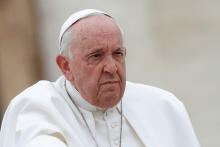
Sexual abusers are disgusting “enemies” who deserve to be condemned and punished — but also deserve Christian love and pastoral care because they too are children of God, Pope Francis said.
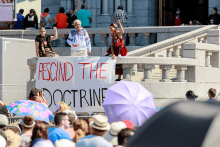
The Vatican on Thursday formally repudiated the colonial-era “doctrine of discovery,” used centuries ago to justify European conquests of Africa and the Americas, saying “it is not part of Catholic Church teaching.”
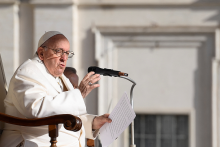
Pope Francis has a respiratory infection and will need to spend “a few days” in hospital for treatment, the Vatican said in a statement on Wednesday
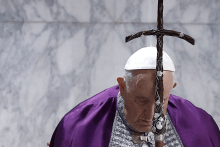
Pope Francis marks 10 years as head of the Roman Catholic Church on Monday celebrating Mass with cardinals in the chapel of the Vatican's Santa Marta hotel where he has lived since his election.

IT SEEMS PATENTLY obvious: We live in a world of limited resources. Because of that, humans simply cannot continue to relentlessly produce and consume more and more stuff and expect the planet to survive. The path of unchecked growth is, without doubt, not sustainable. And yet, mainstream economists and headline writers still seem stuck in the mantra that “growth” (by which they mean increases in misleading measures such as gross domestic product) is an unmitigated good — the alternatives being dire situations such as “stagflation” and recession, and thus to be avoided at all costs.
Prophets among us have challenged that view, and have been ostracized by “respectable” experts as a result. Pope Francis, for instance, in his 2020 book Let Us Dream, wrote that “in the wealthier parts of the world, the fixation with constant economic growth has become destabilizing, producing vast inequalities and putting the natural world out of balance.” Swedish activist Greta Thunberg, in her usual plain-spoken way, famously challenged world leaders on the subject: “We are in the beginning of a mass extinction, and all you can talk about is money and fairy tales of eternal economic growth. How dare you!”

IN NOVEMBER, a stray missile from the Russia-Ukraine war landed in Poland, killing two men in their 60s who worked at a grain warehouse. It took several emergency meetings with NATO officials to determine whether Russia had intentionally escalated the war into the region of the Western military alliance. All parties deemed it an “accident.” (The missile came from Ukraine.)
What if that stray missile had a nuclear warhead?
Russian President Vladimir Putin’s threat to use nuclear weapons in Ukraine must be firmly condemned, as well as his cruel and illegal war with its continued escalation. But accidents happen. Even a limited or regional use of nuclear weapons could have planetary effects, blocking the sun enough to cause a global temperature drop, collapsing crop production, and resulting in massive starvation, according to a report by the International Physicians for the Prevention of Nuclear War.
As the Poland example shows, today we are facing the most serious nuclear threats since the Cuban missile crisis 60 years ago, which then-Secretary of Defense Robert McNamara said we survived only by luck.
Nuclear weapons raise biblical issues. The continuing survival of God’s creation and the human race cannot rely on just “luck” but instead needs providential intervention. A few weeks before the November missile crisis in Poland, Pope Francis said, “Today, in fact, something we dreaded and hoped never to hear of again is threatened outright: the use of atomic weapons, which even after Hiroshima and Nagasaki continued wrongly to be produced and tested.”
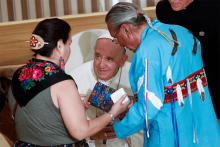
Pope Francis’ July visit to the First Nations in Canada has rekindled conversations about the Catholic Church’s responsibility in blessing and legitimizing the colonization of Indigenous homelands.

WHY THE RECENT surge in union activity? The nationwide shortage of workers is one factor, to be sure, as is the COVID pandemic. But another contagion might be even more important: Hope. “You see it most clearly with the Starbucks campaign where they won those initial two victories, and it was like a switch going off for people: ‘We can do this!’” labor attorney Alex van Schaick told Sojourners. “There was a contagion effect, in a positive sense. Hope is contagious — I think that’s really true.” Clayton Sinyai, executive director of the Catholic Labor Network, agreed that the confidence and resolve of workers is making a dramatic difference. “It seemed for a long time that employers had gotten so skilled at manipulating the union election process that a lot of people had become very discouraged about trying to form unions,” Sinyai said. “Now we’re seeing a generation of workers who are not taking no for an answer.”
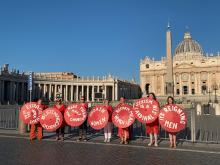
Kate McElwee, the executive director of the Women’s Ordination Conference and one of the women at the protest, spoke with Sojourners’ Mitchell Atencio about her hope for women’s ordination, Francis’ attitude toward reforms, and the symbolic nature of their activism.
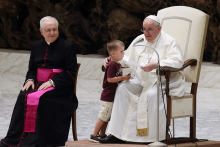
Pope Francis was delighted when a young boy stormed onto the stage during his general audience on Wednesday, in which he addressed the topic of dialogue between young and old people.
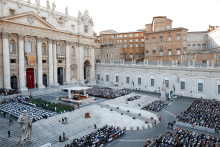
The Vatican on Tuesday issued an overarching investments policy to ensure they are ethical, green, low-risk, and avoid weapons industries or health sectors involved in abortion, contraception, or embryonic stem cells.
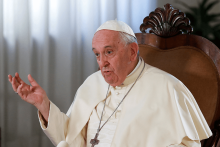
Pope Francis said he wants to give women more top-level positions in the Holy See and disclosed that for the first time he would name women to a previously all-male Vatican committee that helps him select the world’s bishops.

Pope Francis said that while the Vatican’s secret and contested agreement with China on the appointment of Roman Catholic bishops is not ideal, he hopes it can be renewed in October because the church takes the long view.
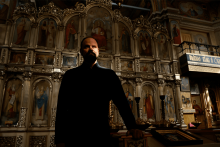
For years a vocal minority at Saint Nicholas’ parish in the middle-class Kyiv commuter town of Irpin resisted calls to split from their spiritual fathers in Moscow.

The Vatican’s decision to have both Ukrainians and Russians take part in Pope Francis’ “Way of the Cross” procession on Friday has caused friction with Ukrainian Catholic leaders, who want it to be reconsidered.
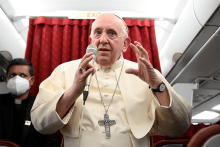
Pope Francis paid tribute on Sunday to journalists killed during the Ukraine war saying he hoped God would reward them for serving the common good whatever side they were on.
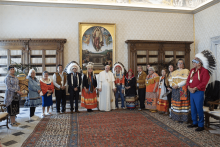
Pope Francis apologized to Canadian Indigenous peoples on Friday for the Roman Catholic Church's role in residential schools that sought to erase their cultures and where many children suffered abuse.
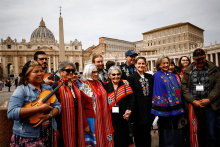
Survivors of Canada’s residential schools on Monday asked Pope Francis for unfettered access to church records on the institutions where Indigenous children were abused and their culture denied.